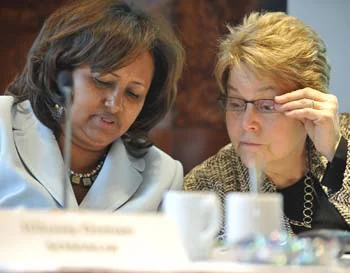Karama Brings Arab Perspective to the UN Commission on the Status of Women
Hibaaq_Osman2
NEW YORK, NY, March 4, 2010 – On March 3, Karama and UNIFEM convened a one-day conference attended by more than 100 people at the 54th session of the Commission on the Status of Women (CSW) to present a detailed review of progress towards the gender equality goals set fifteen years ago in the Beijing Platform for Action and after ten years of the Millennium Development Goals and 30 years of CEDAW implementation.
Karama’s delegation of 30 activists from 10 Arab countries were at the event to present the Arab Regional NGO Shadow Report on Beijing+15, and to bring voices from around the Arab world to bear on governmental action and UN processes to empower women and girls. Speakers included Arab women leaders of the UNDP, ESCWA, UNESCO, UNIFEM, and leading NGOs from the Arab States, in addition to 2 parliamentarians, Haifa Abu Ghazaleh, a senator of Jordan, and Latifa Jbabdi, a member of parliament in Morocco. A full list of speakers and their biographies is available here.
A central theme of the day’s discussion was the interface between NGOs and the region’s governments in the struggle for women’s justice and equality.
“We have willing governments; they have agreed to some things, and, looking forward, governments are actually willing to work with non-governmental organizations, so it’s extremely important to pressure governments, not in a negative way, but to educate them, to raise their awareness, to use every power that we have,” noted Hibaaq Osman, founder and CEO of Karama.
Another goal of the session was to forge a deeper understanding of relationships between the CEDAW treaty, the Beijing Platform for Action and the Millennium Development Goals. This theme was taken up in the presentation of Dr. Fatema Khafagy of the Alliance for Arab Women, and member of the Karama delegation from Egypt.
“If we really want to accelerate progress in the Arab world towards the first MDG of eradicating extreme poverty and hunger, we need to boost services to female heads of household,” stated Dr. Khafagy, emphasizing the interconnectedness of women’s empowerment with all of the Millennium Development Goals and not just MDG #3, which specifically focuses on achieving gender equality and empowerment for women.
Next week, Samia El Hashmi, a member of the Karama delegation from Sudan will deliver an oral statement to the Commission on the Status of Women on behalf of the Middle East NGO Caucus at CSW. This statement, drafted jointly by delegation members from across the region, will seek governments’ compliance with the mandatory Security Council Resolution 1325, which seeks the protection and promotion of women in the resolution of violent conflict and military occupation, particularly refugees, internally displaced persons, detainees and women taken hostage.
Karama (meaning “dignity” in Arabic) enacts initiatives supporting women leaders and activists from eleven countries of the Middle East and North Africa building a movement to end violence against women and girls. For more information on Karama, visit www.el-karama.org or contact Sarah Vaill at +1 (323) 251-6521.
Attachment
Size
211.51 KB

